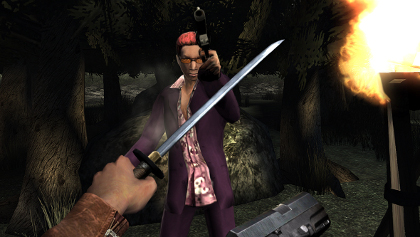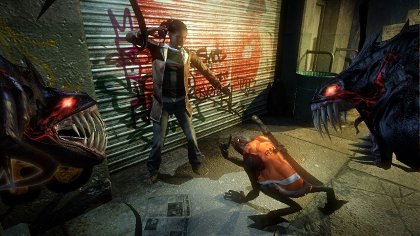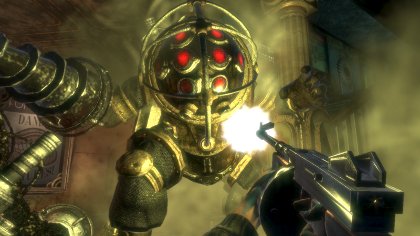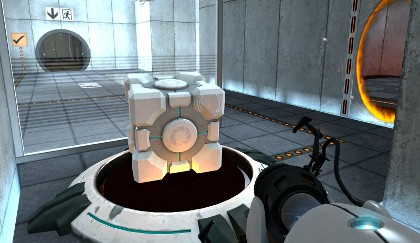Another franchise of PC origin, Rainbow Six, made its wholesale transition to the console audience with the release of Vegas, including previous unthinkable features such as recharging health. Although undoubtedly still a great game in its own right (particularly in co-op multiplayer), it was barely recognisable as the super-challenging tactical action game Red Storm had weaned almost a decade prior.
At the same time, the FPS was making its mark on new platforms with mixed success. Titles like Medal of Honor: Heroes on PSP proved what an error the lack of a second analogue stick was. Ubisoft’s Wii-exclusive Red Steel demonstrated the rich potential for first person titles on the new platform, while games like Far Cry Vengeance and Medal of Honor Vanguard showed just how badly that potential could be abused.
By mid-2007, it was painfully obvious that few shooters would be able to make any kind of an impact without really pushing the genre forward. After wowing the critics with Riddick three years before, much was expected from Starbreeze’s next project, The Darkness, and the team delivered with a memorable and original horror experience, if not a flawlessly executed one.
Meanwhile, the Wii’s standing among FPS players improved drastically with the arrival of the excellent Metroid Prime: Corruption – arguably the first to properly tap the intuitive fluidity of motion-based controls, but certainly not the last.
On the HD front, perhaps the most highly regarded shooter since Half-Life 2 emerged in the shape of Bioshock. Set in a dystopian underwater art deco city, it was undoubtedly one of the most beautifully realised game worlds ever conceived, with a compelling narrative and visuals to die for. The trap-based gameplay and RPG-style upgrade system gave players a great deal of flexibility, and the acclaim was suitably deafening.
Christmas that year was inundated with shooters, with also-rans like Timeshift, Medal of Honor Airborne and Clive Barker’s Jericho being trampled in the crush by some of the best titles the genre had ever seen.
Leading the pack were Call of Duty 4: Modern Warfare, Halo 3, and Valve’s hugely generous The Orange Box – a five-strong compilation pack which included a new Half-Life 2 episode alongside the original Half-Life 2, Episode One, the long-awaited Team Fortress 2 and the wonderfully inventive first person puzzle ‘shooter’ Portal. Now available for the first time on PS3 and 360 alongside PC, these were an embarrassment of riches.
Episode Two proved a big improvement, both longer and more exciting than Episode One with a fantastic conclusion, while Team Fortress 2 leant a touch of humour to the uber-seriousness of team-based multiplayer fun, and continues to be essential more than two years on.









 Satoru Iwata Video Interview - the late Nintendo president spoke with Kikizo in 2004 as 'Nintendo Revolution' loomed.
Satoru Iwata Video Interview - the late Nintendo president spoke with Kikizo in 2004 as 'Nintendo Revolution' loomed. Kaz Hirai Video Interview - the first of Kikizo's interviews with the man who went on to become global head of Sony.
Kaz Hirai Video Interview - the first of Kikizo's interviews with the man who went on to become global head of Sony. Ed Fries Video Interview - one of Xbox's founders discusses an epic journey from Excel to Xbox.
Ed Fries Video Interview - one of Xbox's founders discusses an epic journey from Excel to Xbox. Yu Suzuki, the Kikizo Interview - we spend time with one of gaming's most revered creators.
Yu Suzuki, the Kikizo Interview - we spend time with one of gaming's most revered creators. Tetris - The Making of an Icon: Alexey Pajitnov and Henk Rogers reveal the fascinating story behind Tetris
Tetris - The Making of an Icon: Alexey Pajitnov and Henk Rogers reveal the fascinating story behind Tetris Rare founders, Chris and Tim Stamper - their only interview? Genuinely 'rare' sit down with founders of the legendary studio.
Rare founders, Chris and Tim Stamper - their only interview? Genuinely 'rare' sit down with founders of the legendary studio. The History of First-Person Shooters - a retrospective, from Maze War to Modern Warfare
The History of First-Person Shooters - a retrospective, from Maze War to Modern Warfare
[...] Parte 5 (2006-2009) Categorías: VideojuegosTags: crysis, FPS, Halo, juegos, Quake [...]